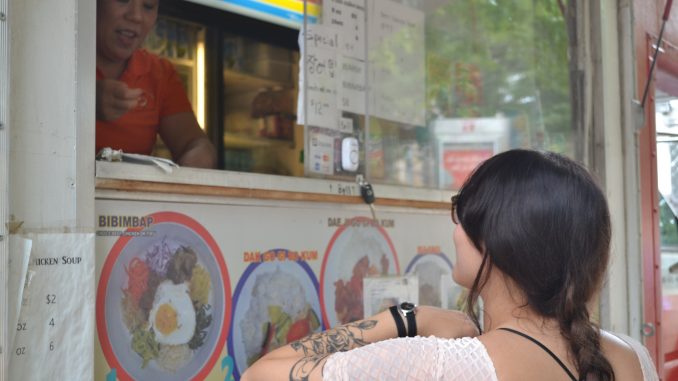
John Song said he grew up with “traditional” Korean food.
“I live in an environment where Korean food is traditional,” Song said. “[Other Korean restaurants] cater towards college students, they like salty foods, they like really flavorful foods so ours is … healthier than regular food.”
Song, the son of Korean immigrants, is the cashier at Cha Cha, a Korean-Japanese fusion truck located on Montgomery Avenue near 13th Street.
Several food trucks on Main Campus, like Cha Cha and Korea House, work to bring the traditional Korean styles to the university.
John Song, a 2016 management and information science alumnus from Drexel University, said his mother and father, Sun and Chong Song, came from South Korea in their mid-30s.
Before John Song was born, Chong Song was a chef for several Korean restaurants throughout Philadelphia. When John Song was 8, his father opened his own Korean barbecue restaurant in Upper Darby called Nagwon Garden. Then his parents bought the truck in the early 2010s.
“He wanted to make even more money, so he decided to invest in a food truck and that was a good idea,” John Song said. “It doesn’t seem like there are a lot of Korean food trucks that stick to Korean roots food-wise.”
Some of their most popular items include “Donkas,” which is a Japanese adaptation of a marinated pork cutlet and the pork barbecue.
The most important part of “Galbi,” beef short ribs, is that they’re marinated in a pear juice-based sauce.
“We marinate that in sugar, and other ingredients and let it marinate for awhile until it soaks up all the juice and then let it give itself its own flavor,” John Song said.
He added that Americans aren’t used to the smell of dishes like “Kimchi,” fermented cabbage.
“They’ll smell Kimchi and they’ll move away from it because it has a certain smell that you aren’t used to in American traditions,” he said.
Some new items on the menu this year include “Tteokbokki,” which is a rice cake “drizzled in a spicy sauce” and “Kkanpunggi,” which is fried chicken “doused in a sweet and spicy sauce,” he said.
Operating a food truck doesn’t require much English, John Song, whose parents have a language barrier, said.
“Students will understand gestures like “No. 2,” they don’t really need much,” he said.
On Norris Street near 13th sits Korea House, another Korean food truck working to preserve traditions. The truck opened in May 2015 on Main Campus.
Erica Kim, a 2013 international business and risk management and insurance alumna, is the daughter of Sooja Kim, the owner of Korea House.
Erica Kim, speaking in translation for her mother, said her parents aren’t “foreign” to selling food on the street. When Sooja Kim and her husband first arrived in America in 1988, they had a fruit salad truck in Center City.
Sooja Kim also isn’t foreign to working on a college campus. She opened Nara Japanese Restaurant on University of Pennsylvania’s campus, which closed in 2014.
“I think my parents enjoy it when students try Korean food,” Erica Kim said. “Some students are trying it for the first time and they really enjoy it.”
She added that a big aspect of Korean food entails a “fermentation process,” with spicy red pepper paste and soy bean paste.
“To make those ingredients it takes a really long time, there is a lot of work that goes into it,” Erica Kim said. “They are all about getting the word out on Korean food and I guess everybody is starting to pick up and enjoy it too.”
Emily Scott can be reached at emily.ivy.scott@temple.edu.


Be the first to comment